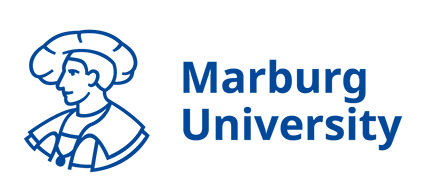Main Content
SYNMIKRO SYMPOSIUM "Enzyme Design and Evolution: Unlocking a Sustainable Future." The 12th annual Symposium of the Center of Microbiology will take place on 23 April 2025.

SYNMIKRO SYMPOSIUM "Microbes 4 Climate" - From Greenhouse Gases to Products - 2024 May 22nd at the Cineplex in Marburg
Current research and fascinating possibilities in the fight against climate change
The consequences of climate change are becoming increasingly obvious and strategies to counteract them are urgently needed. Producing fewer climate-damaging gases, such as carbon dioxide or methane, are possible steps in this direction. Microorganisms have an amazing repertoire, such as the ability to bind greenhouse gases. This makes them ideal for the production of environmentally friendly and sustainable plastic alternatives as well as biological fuels or for use in recycling. These are central topics of the SYNMKRO symposium "Microbes 4 Climate", which took place on May 22, 2024 in the Marburg Cineplex and ended with an exciting and entertaining performance by Youtuber Jacob Beautemps.
The Center for Synthetic Microbiology (SYNMIKRO), which was founded with Support of the LOEWE Initiative of Hesse, is a network of scientists from Philipps University Marburg, Justus Liebig University Giessen and the Max Planck Institute for Terrestrial Microbiology. The aim of the center is to use microorganisms for the sustainable conversion of greenhouse gases for the benefit of the environment. To this end, basic metabolic pathways are researched and synthetic biology methods are applied to cultivate microorganisms with optimized properties.
Overview of selected contributions and their content
Under the title "Microbes 4 Climate - From Greenhouse Gases to Products", a comprehensive and highly topical program with international speakers was offered. After introductory remarks by Thomas Spies, Mayor of the City of Marburg, and Tobias Erb, Director of the Max Planck Institute for Terrestrial Microbiology, Justin North (Ohio State University, USA) and Diana Sousa (Wageningen University, Netherlands) gave an insight into their current projects. Prof. Sousa's research focuses on the joint cultivation of different bacterial strains, which are optimized in such a way that their metabolic pathways complement each other optimally and the source material CO2 can thus be utilized particularly efficiently.
This produces useful carbon compounds such as hexanol or butanol, which are important as basic materials for the chemical industry. Justin North's research group is working on the microbial conversion of CO2 into Ethylene. Ethylene is an important raw material for the production of plastics. Conventionally, Ethylene is produced from fossil fuels and therefore has a poor carbon footprint. However, this can be significantly improved with the help of microorganisms, as they bind CO2 during production instead of releasing it.
In the second block, Bonnie Murphy from the Max Planck Institute of Biophysics in Frankfurt presented results from basic research. The scientists have succeeded in fully elucidating the structure of the microbial enzyme that converts carbon monoxide into carbon dioxide. They are thus making an important contribution to our understanding of how microorganisms work. Johannes Rebelein from the Max Planck Center for Terrestrial Microbiology in Marburg focused his presentation on another microbial enzyme: Nitrogenase. Among other things, Nitrogenases can convert CO2 into ethylene, which, as already mentioned, serves as a starting material for the production of plastics. The optimization of the yield is also the subject of current research.
Dipti Nayak (University of California, USA) opened the third thematic block in the early afternoon. She is particularly interested in the greenhouse gas Methane, which can be oxidized to CO2 by certain archaea, unicellular organisms that are not bacteria. Methane production on the planet is increasing massively and the gas is fueling climate change far more than CO2. Nico Claassens (Wageningen University, Netherlands) then spoke about how the microbial CO2 metabolism can be optimized: for example, foreign enzymes are integrated in order to increase the yield of a desired product.
The last thematic block focused on the practical application of microorganisms. Two Hessian companies, Algoliner GmbH & Co. KG and BRAIN Biotech AG, presented their innovative approaches. Algoliner offers special photobioreactors for microalgae, which are primarily designed for sustainability. The material used is Plexiglas instead of borosilicate glass, which is both recyclable and can be shaped directly at the assembly site, thus saving on material and transportation costs. The aim is to offer a cost-effective and scalable system for cultivating microalgae, which bind CO2 and are of interest as a raw material in the food industry, for example.
BRAIN AG finds solutions for more sustainable production processes with the help of bacteria. Most of these projects are in the cleantech sector, i.e. the field of sustainable process optimization. Case studies include the production of Succinate from CO2 using bacteria to produce bioplastics, the recycling of batteries and the recovery of precious metals such as gold from electronic waste using microorganisms.
Cornelia Welte (Radboud University, Netherlands) concluded the lecture series with her report on the complex extraction of methane-converting archaea. Since, unlike the vast majority of bacterial strains, these cannot be acquired commercially, they have to be isolated from soil samples and cultivated in a very lengthy process in order to gain more knowledge about the functional mechanism and the necessary culture conditions so that archaea can also be used for climate protection in the future.
A special highlight of the event was the first presentation of the "M4C Explorer Research Award" to Shanshan Luo by Professor Anke Becker.
The organizers had also come up with something very special for the conclusion of the groundbreaking symposium: Jacob Beautemps, whose "Breaking Lab" channel presents scientific topics in an equally exciting and entertaining way for the general public, made sure that many of his fans joined the audience already present to experience him live at the Marburg Cineplex: With the title "The future is now - innovations that make our lives better", he gave the audience new impetus for a more positive view of difficult times.


